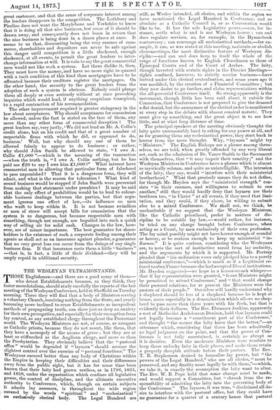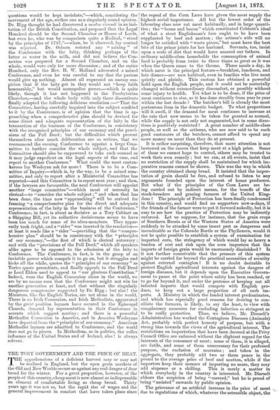THE WESLEYAN ULTRAMONTANES.
THOSE Englishmen—and there are a good many of them— who detest Establishments because, as they think, they foster sacerdotalism, should study carefully the reports of the last meeting of the Wesleyan Conference, held at Sheffield on Tuesday morning. There they will find that a body of Ministers serving a voluntary Church, receiving nothing from the State, and yearly becoming more inclined to erase Establishments as inexpedient methods of propagating truth, can show just as deep an anxiety for their own prerogative, and especially for their exemption from lay control, as any established clergy throughout the Protestant world. The Wesleyan Ministers are not, of course as arrogant as Catholic priests, because they do not assert, like them, that they have a monopoly of the means of grace ; but they are at least as stiffneeked as the Anglican clergy, and more so than the Presbyterian. They obviously believe that the "pastoral office" would be degraded if " laymen " should assume the slightest control over the exercise of "pastoral functions." The Wesleyans succeed better than any body of Christians within the Empire in keeping their difficulties and their differences away from the public sight, but it has for some time been known that their laity had grown restless, as in 1796, 1835, and 1858, under the organisation which confines all legislative power, the control of discipline, and the ultimate executive authority to Conference, which, though on certain Subjects it admits lay assessors, is throughout the wide region covered by the words " spiritual " and "ecclesiastical" an exclusively clerical body. The Legal Hundred are
I still, as Wesley intended, all clerics, and within the region we have mentioned the Legal Hundred is Conference, and as absolute as a Catholic Council is, or ai Convocation would like to be. It has the sole Legislative power,—can, for in- stance, settle what is and is not Wesleyan heresy ; can and does regulate services, as, for example, in the Hymn-book controversy ; can rearrange all ecclesiastical methods,—for ex- ample, it can, as was stated at this meeting, maintain or abolish class-meetings, the most distinctive feature of Wesleyan dis- cipline—and can and does keep to itself the whole of the range of functions known to English Churchmen as those of Episcopal Courts and of the Court of Arches. The laity, though invested with certain rights in the District Meetings— rights confined, however, to strictly secular business—have fretted under this clerical centralisation, and some years ago it was modified, by the creation of a Financial Committee ; but they now desire to go further, and claim representatives within the all-powerful Conference itself. So strong apparently is the movement, though little has been said about it outside the Connexion, that Conference is not prepared to give the demand a flat denial, but the annoyance of the clerical order is manifested at every step in the debate with almost comical nalvettS. They must give up something, and the great object is to see how little, and at what long distance of time.
The principal speakers at the meeting obviously thought the laity quite unreasonably hard in asking for any power at all, and as for granting them any ecclesiastical power, they start back in horror from the mere thought. Why, "laymen" might try "Ministers." The English Bishops use a phrase among them- selves, we are told, when greatly offended by any very liberal act, such as the admission of Dr. Vance Smith to the Sacrament with themselves, that "it may impair their sanctity ;" and the Wesleyan Ministers in Conference have a phrase which is almost as mystically solemn, and quite as unintelligible. The intrusion of the laity, they say, would "interfere with their ministerial brotherhood." What that precisely means they do not define, for though Mr. Hayden says the "ministerial strength" con- sists "in their oneness, and willingness to submit to one another," still they would hardly deny that laymen are their brethren too, "in Christ" at all events, if they need that limi- tation, and they could, if they chose, be willing to submit also to a mixed Conference. We shall not, we think, be uncharitable if we suggest that the Wesleyan Ministers, like the Catholic priesthood, prefer in matters of dis- cipline to be outside lay law, —would rather, for instance, be tried on any charge brought before Conference, when acting as a Court, by men exclusively of their own profession. The lay mind possibly might not have horror enough of scandal or heresy, or be zealous enough to keep up ministerial "in- fluence." It is quite curious, considering who the Wesleyans are, to note the sort of instinctive recoil from lay audacity, and the arguments by which it is supported. Mr. Portrey pleaded that his ordination vows only pledged him to a purely ministerial conference,"—which is much as if a Legitimist re- fused to obey France because she had accepted liberal institutions. Mr. Hayden suggested—we hope in a horror-struck whisper— that if lay representation were granted, "fewer Ministers might be permitted to attend Conference," and "that would change their pastoral relations, for at present the Ministers were the pastors of their people." Outsiders will hardly understand why a shepherd should be less of a shepherd because he is kept at home, more especially in a denomination which allows no shep- herd to pass more than three years with his flock, but that is evidently their dullness. The Rev. Ebenezer Jenkins, apparently a sort of Methodist Archdeacon Denison, held that laymen could not legally become a "constituent part of the Conference," and thought "the sooner the laity knew that the better,"—an utterance which, considering that there has been admittedly no legal judgment on the point, and that the power of Con- ference is not fully ascertained, is certainly as abrupt as it is decisive. Even the moderate Ministers were resolute to keep those unlucky laity in their places, and make them retain a properly sheepish attitude before their pastors. The Rev. T. B. Stephenson desired to formulise lay power, but "the powers of the Legal Hundred," who are all clerics, "must be preserved, and any finality must legally be with them,"—which, we take it, is exactly the assumption the laity want to alter. The Rev. W. B. Pope held that some change must be made, and would support a Committee, but shrank from the re- sponsibility of admitting the laity into the governing body of the Conference." The laymen, it was true, "disclaimed all de- sire to interfere with the pastoral office, but they could have no guarantee for a quarter of a century hence that pastoral questions would be kept inviolate,"—which, considering the movement of the age, strikes one as a singularly sound opinion. Dr. Rigg thought he had discovered a modus vivendi in an imi- tation of the British Constitution, and proposed that the Legal Hundred should be the Second Chamber or House of Lords, but even he, who was by comparison quite a Radical, "stood by the principles of 1797,"—when, be it observed, lay control
was rejected. Dr. Osborn resisted any " mixing " of the Conference with the laity, thinking perhaps of the latter as water in the milk, and did not believe the Con- nexion was prepared for a Second Chamber, and on the whole, would vote only for more discussion ; and of the entire Hundred, only the Rev. H. W. Holland advocated a mixed Conference, and even he was careful to say that the pastors would give up nothing. Almost all expressed an uneasy sus- picion that if the laity got in they would not "keep faith honourably," but would monopolise power,—which is quite likely, though it has not happened in the Presbyterian Churches,—and the whole body with only three dissentients finally adopted the following delicious resolution :—" That the Committee, having carefully inquired into the subject confided to it by the Conference, is of opinion that the time is ap- proaching when a comprehensive plan should be devised for some direct and adequate representation of the laity in the transaction of the business of the Conference, in consistency with the recognised principles of our economy and the provi- sions of the Poll Deed ; but the difficulties which present themselves after much deliberation are so serious, that we recommend the ensuing Conference to appoint a large Com- mittee to further consider the whole subject, and that the Committee should also be empowered to take such counsel as it may judge expedient on the legal aspects of the case, and report to another Conference." What could the most cantan- kerous lay Wesleyan ask for more ? There is to be a Com- mittee of Inquiry—which is, by the way, to be a mixed com- mittee, and only to report after a Ministerial Committee has reported—and this Committee is to report next year ; and then, if the lawyers are favourable, the next Conference will appoint another "large committee"—which must of necessity be clerical—to "consider the whole subject ;" and when that has been done, the time now "approaching" will be arrived for framing "a comprehensive plan for the direct and adequate representation of the laity in the business of the Conference." Conference, in fact, is about as decisive as a Tory Cabinet on a Shipping Bill, yet its collective decisiveness seems to have been too much for some of its ultra-members. They appar- ently took fright, and a " rider " was inserted in the resolution— at least it reads like a "rider "—providing that the "compre- hensive plan" should be in consistency with the "principles of our economy,"—the first of which is clerical autocracy ; and with the "provisions of the Poll Deed," which all speakers alike agree to be opposed to the admission of the laity to Conference. The Conference, in fact, is in the grasp of an invisible power which compels it to go on, but it struggles and kicks all the while, quotes the "principles of our economy" as Tories quote precedents, and finally appeals to the Poll Deed as Lord Eldon used to appeal to "our glorious Constitution." Indeed, were the English Connexion alone in the world, we are by no means sure that the Conference might not win for another generation at least, and that without the singularly dangerous compromise suggested by Dr. Rigg ; but alas ! the Ministers, like the English Tories, are not alone in the world. There is an Irish Connexion, and Irish Methodists, aggravated by the great position laymen have secured in the Episcopal Church, demand lay representation in their Conference in accents which suggest mutiny; and there is a powerful Methodist Connexion in America, and in America Wesleyans have departed from the ," principles of our economy." American Methodist laymen are admitted to Conference, and the world does not go to pieces. In Methodism, as in politics, the reflex influence of the United States and of Ireland, alas ! is always solvent.































 Previous page
Previous page